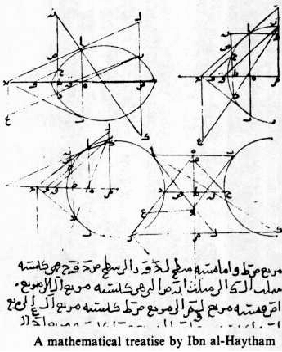| |
|
| |
|
|
| |
There is
no doubt that mathematics and astronomy
owe a great debt to the Arabs. As George
Sarton, the great Harvard historian of
science, wrote in his monumental Introduction
to the History of Science:
From
the second half of the eighth to
the end of the eleventh century, Arabic
was the scientific, the progressive
language of mankind. When the West was
sufficiently mature to feel the need of
deeper knowledge, it turned its
attention, first of all, not to the Greek
sources, but to the Arabic ones.
In
the twelfth century, Europe became aware
of the scientific achievements of the
Arabs and embarked upon serious
translations of their rich legacy. A
special college for translators was
founded in Toledo, Spain, and it was
there, and in other centers, that some of
the great Christian scholars translated
most of the Arabic works on mathematics
and astronomy. In most European
universitie5 Arab treatises formed the
basis of mathematical studies.
The
history of Arab mathematics began with
Muhammad ibn Musa al-Khawarazmi who, in
the
|
|
| |
|
|
|
|
| |
|
|
| |
ninth
century, journeyed east to India to learn
the sciences of that time. He introduced
Hindu numerals, including the concept of
zero into the Arab world. This number
system was later transmitted to the West.
Prior to the use of"Arab"
numerals, as we know them today, the West
relied upon the somewhat clumsy system of
Roman numerals. Whereas in the decimal
system, the number 1948 can be written in
four figures, eleven figures were needed
using the Roman system: MDCCCXLVIII. It
is obvious that even for the solution of
the simplest arithmetical problem, Roman
numerals called for an enormous
expenditure of time and labor. The Arab
numerals, on the other hand, rendered
even complicated mathematical tasks
relatively simple.
The scientific
advances of the West would have been
impossible had scientists continued to
depend upon the Roman numerals and been
deprived of the simplicity and
flexibility of the decimal system and its
main glory, the zero. Though the Arab
numerals were originally a Hindu
invention, it was the Arabs who turned
them into a workable system; the earliest
Arab zero on record dates from the year
873, whereas the earliest Hindu zero is
dated 876. For the subsequent four
hundred years, Europe laughed at a method
that depended upon the use of zero,
"a meaningless nothing."
Had the Arabs given us nothing but the
decimal system, their contribution to
progress would have been considerable. In
actual fact, they gave us infinitely
more. While religion is often thought to
be an impediment to scientific progress,
we can see, in a study of Arab
mathematics, how religious beliefs
actually inspired scientific discovery.
Because of the Qur'an's very
concrete prescriptions regarding the
division of an estate among children of a
deceased person, it was incumbent upon
the Arabs to find the means for very
precise delineation of lands. For
example, let us say a father left an
irregularly shaped piece of
land-seventeen acres large-to his six
sons, each OAA~ of whom had to receive
precisely one-sixth of his legacy. The
mathematics that the Arabs had inherited
from the Greeks made such a division
extremely complicated, if not impossible.
It was the search for a more accurate,
more comprehensive, and more flexible
method that led Khawarazmi to the
invention of algebra. According to
Professor Sarton, Khawarazmi
"influenced mathematical thought to
a greater extent than any other medieval
|
|
| |
|
|
|
|


